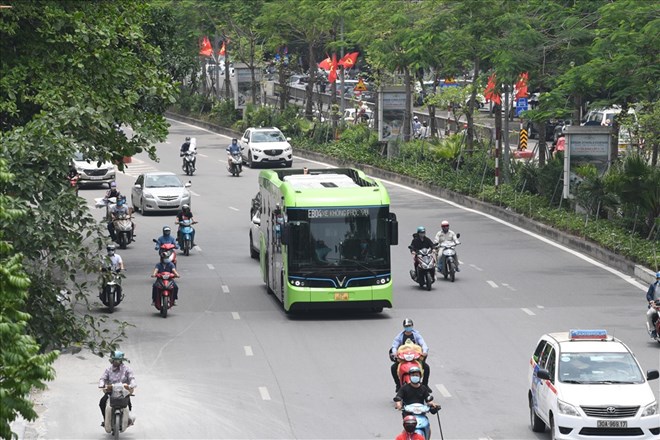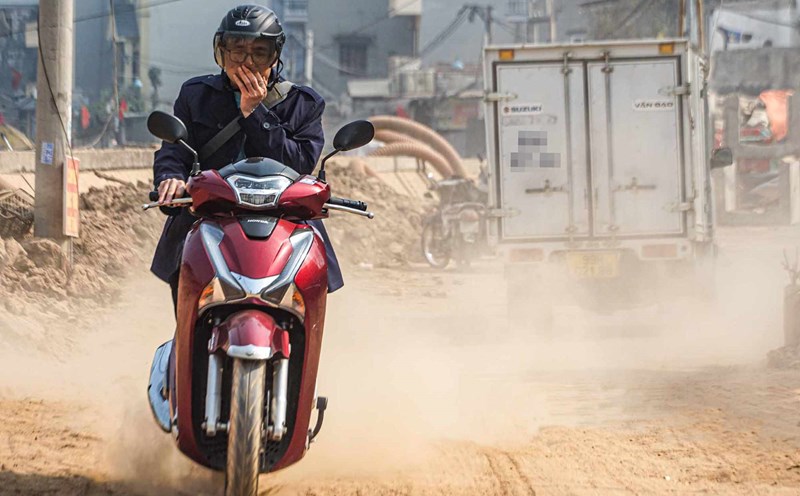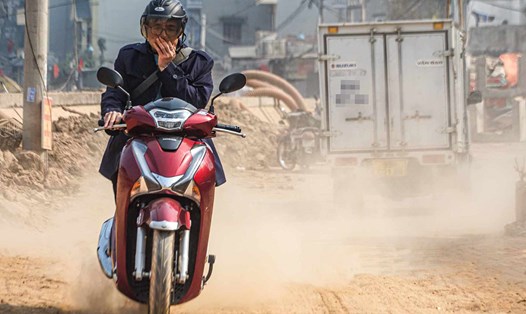Changes in awareness, habits and behavior
In order to gradually limit polluting cars and motorbikes running on gasoline, the Government has issued many important policies. In particular, Decision No. 876/QD-TTg of the Prime Minister issued the Green Energy Transition Program, reducing carbon and methane emissions in the transportation industry. Recently, Directive 20/CT-TTg dated July 12, 2025 was also issued, requiring the implementation of urgent tasks to address environmental pollution.
One of the notable points is that Hanoi is required to implement the roadmap from July 1, 2026, no more fossil fuel motorbikes are circulating in the Ring Road 1 area. From January 1, 2028, private cars running on gasoline will be restricted in Ring Roads 1 and 2. By 2030, it will be expanded to all personal vehicles using fossil fuels within the Ring Road 3.
However, according to experts, for the policy to come into life, the most important thing is to change people's awareness and habits.
At the seminar "Green transportation transformation: Irreversible trend" organized by Lao Dong Newspaper on July 17, Dr. Hoang Duong Tung - Chairman of the Vietnam Clean Air Network - affirmed that green transformation is an irreversible trend. According to him, to do this, not only the role of the government but also the participation of the people is important. Although gasoline motorbikes are currently very convenient and easy to use, for health and the environment, people need to be ready to give up.
Mr. Ngo Viet Dung - Vice President and General Secretary of the Vietnam Sports Automobile Association - shared: "We all clearly feel how stuffy the Hanoi atmosphere has been in recent years. To change, it is necessary to trade off convenience that has become a habit. He believes that converting is not too difficult if everyone is willing to change.
"Currently, just take a motorbike if you have to walk 300 - 500m, while you can walk, use public transport or switch to environmentally friendly vehicles" - Mr. Dung said.
Dr. Khuat Viet Hung - Chairman of the Board of Directors of Metro Hanoi - raised the issue: going to school, work, going out, going out to eat... are all used to using motorbikes. Now that we have changed, we need to rethink. But all is for the benefit of the people, we should do it.
He cited that the ban on alcohol concentration had previously caused a reaction because alcohol was a habit, but over time, people's awareness has changed. "The same goes for limiting motorbikes running on gasoline. It may be uncomfortable now, but it will get used to it, said Mr. Hung.

No one is left behind
At the seminar, experts all agreed that people's awareness is the most important factor. When the people have agreed, the management agency has also taken support measures so that no one is left behind.
Dr. Hoang Duong Tung said that Hanoi has proposed draft laws to support people to switch to gasoline motorbikes. Accordingly, the city plans to provide direct financial support to people's peace of mind, along with specific and practical measures.
Not only stopping at support, Hanoi is also considering reorganizing traffic, especially public transport. Dr. Khuat Viet Hung said that there is still 80% space for the Hanoi metro line. Along with the development of metro, connecting infrastructure has been improved, making it easier for people to access and park their vehicles at many points.
For example, on the Cat Linh - Ha Dong route, most stations have vehicle parking lots; In the near future, parking lots will continue to be increased. Mr. Hung said: "If you are traveling from Ha Dong, you can park your car at Yen Nghia, La Khe, Van Khe bus stations... and then take the train to the center".
He also said that Metro Hanoi has coordinated with public transport suppliers such as Vinbus, Xanh SM, Hanoi Transport Corporation to create service linkages. People using vehicles such as Grab and electric cars to get to the station will receive a discount on trains.
Hanoi's bus transport capacity is not inferior to that of major cities in the world. This year, 2 urban railway lines will start construction, promoting the green transformation process very quickly, Mr. Hung emphasized.
He also proposed to plan the Ring Road 1 area into a speed limit of 30km/h, while developing an electric passenger bus system like the type running around Hoan Kiem Lake, creating a safe and friendly traffic area.
Mr. Ngo Viet Dung said that in parallel with the development of public transport, Hanoi needs to reorganize traffic, arrange charging stations and appropriate parking spaces. Currently, many apartment buildings and office buildings do not allow parking and charging electric motorbikes in the basement due to safety concerns. Electric motorbikes must be left outdoors, causing inconvenience. In the context of rapidly increasing the number of electric motorbikes, Hanoi needs to soon have appropriate infrastructure solutions.










